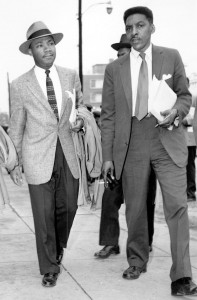The Gay Man Who Organized the March on Washington
On a recent conference call with United Methodist leaders organizing our churches to go to the 50th Anniversary of the March on Washington, I found out that one of the buses was going to show a documentary called Brother Outsider on the way down to the march. “It’s about Bayard Rustin, and not everyone is ready for this film,” said the pastor leading that bus, which will be overflowing with members of his traditional African American church. His statement made me curious, and I immediately searched my memory banks for Bayard Rustin.
I vaguely remembered a brief scene in some dramatic reenactment of Dr. King’s life. Dr. King was a very young leader and he was being targeted for the first time by violence. He was in his house with some other leaders, and he began to take out a gun he used to keep in his home, but Bayard Rustin–who taught Dr. King nonviolence–told him to put it away. Then I remembered…Wasn’t Rustin gay?
Well, that would explain why not everyone would be ready for him. In fact, this nation has never been ready for Bayard Rustin, as I discovered on my internet obsession with this man that has lasted the last 24 hours. I am embarrassed to say that I had no idea just how important Rustin had been to the Civil Rights Movement. He literally brought Gandhi’’s philosophy of nonviolence to the ear and heart of Dr. King, was a co-founder with King of the Southern Christian Leadership Conference, and served as the architect of social organizing in the movement. And, very relevant to this weekend’s demonstrations, he was the de facto organizer of the 1963 March on Washington.
So how has the image of such an important figure in the movement only found its way into one short scene of one film about Civil Rights in my memory banks? Although Rustin was an inspiring and powerful speaker and leader himself, he could never have been a face of the movement. This was in part because he had dabbled in communism in his youth. But it was largely because Rustin was gay. In 1953 he had been arrested for having sex with another man (when homosexuality was still illegal in many places), and his “sexual perversion” was dragged up publicly anytime he got too close to the spotlight.
The nation simply was not ready for him. Today, we are a little closer. This month, 26 years after Rustin’s death, President Obama honored him with the Presidential Medal of Freedom. And 50 years after the march that Rustin organized, many of those who will travel to Washington will not only continue Rustin’s work but will also know his name.
Bayard Rustin is just one more reminder that there is a lot more to social movements than the most famous names. Behind each name you know, there are thousands of names you do not know. There would be no social progress, and there would be no Dr. King’s, without advisors, strategists, campus organizers, marchers, phone bank captains, drivers, fundraisers, and folks who make the cookies for the meetings.
So if you don’t think you can be a Martin or a Malcolm, you can be a Bayard or an Ella. But, for most of us, even those shoes are too overwhelming to fill. So, just to start, you might just try being that unnamed lady or fella who just did a march that one time or who helped make a protest sign for someone else or who gave a few dollars to a church that provided bagels to a bus going down to Washington. Or you might just be that person who mentions Bayard Rustin’s legacy to your friends at a bar or who takes a minute to overcome a bias to make a human encounter. Every part of a movement for change is crucial and important. Every part is participating in God’s work. Every part will change you just a little and will change the world just a little too.
Indeed, the body does not consist of one member but of many. If the foot would say, “Because I am not a hand, I do not belong to the body,” that would not make it any less a part of the body. And if the ear would say, “Because I am not an eye, I do not belong to the body,” that would not make it any less a part of the body. If the whole body were an eye, where would the hearing be? If the whole body were hearing, where would the sense of smell be? But as it is, God arranged the members in the body, each one of them, as she chose. If all were a single member, where would the body be? As it is, there are many members, yet one body. The eye cannot say to the hand, “I have no need of you,” nor again the head to the feet, “I have no need of you.” On the contrary, the members of the body that seem to be weaker are indispensable, and those members of the body that we think less honorable we clothe with greater honor, and our less respectable members are treated with greater respect…
I Corinthians 12:14-23
There are still seats on our bus to go to the March this Saturday! If you’re interested, please contact pastorvicki@churchofthevillage.org. Also, if you’re not marching but want to see Brother Outsider, it will be playing at St. Nicolas Park in Harlem at 7:30pm on Saturday night.

